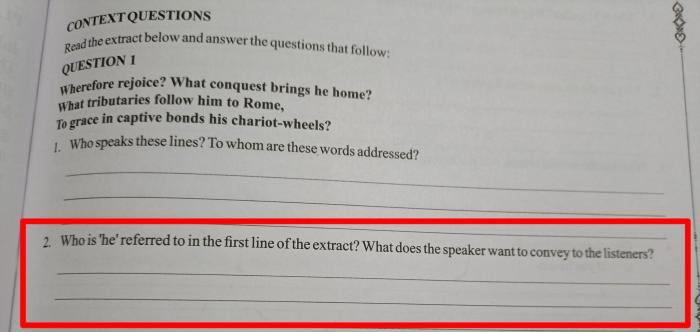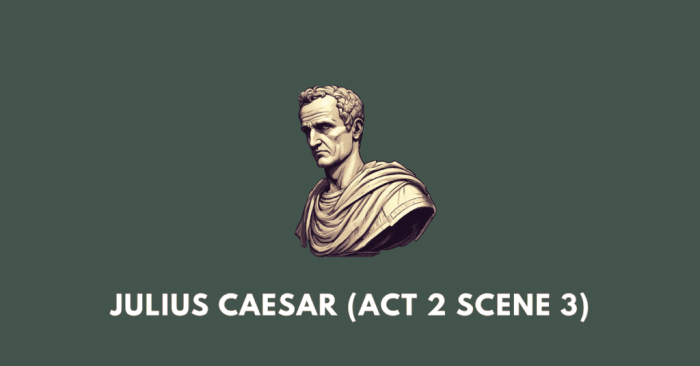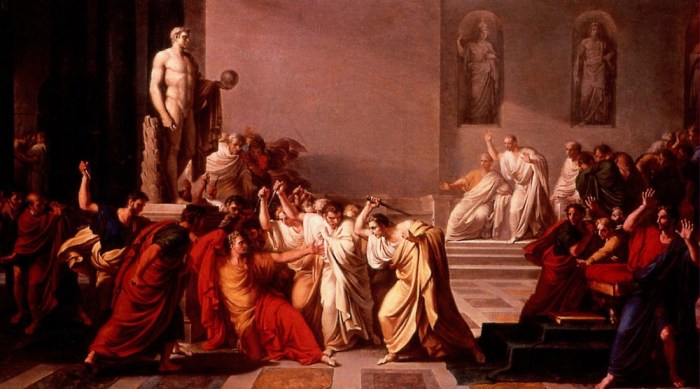Julius caesar act 3 scene 1 questions and answers – As we delve into the intricate world of Julius Caesar Act 3 Scene 1, we embark on a journey of political intrigue, character development, and dramatic tension. This scene holds pivotal significance in Shakespeare’s masterpiece, setting the stage for the tragic events that follow.
In this comprehensive analysis, we will dissect the key plot points, character motivations, and literary devices employed by Shakespeare to create a scene that captivates and provokes profound contemplation.
Plot Summary: Julius Caesar Act 3 Scene 1 Questions And Answers

Act 3 Scene 1 of Julius Caesar opens with the conspirators gathered in Brutus’s orchard, discussing their plans to assassinate Caesar. Cassius has persuaded Brutus to join the plot by appealing to his sense of honor and his belief that Caesar is a threat to Roman liberty.
The conspirators agree to strike on the day of the Lupercal festival, when Caesar will be most vulnerable.
As the scene progresses, the conspirators become increasingly nervous and agitated. They fear that their plot will be discovered and that they will be punished for treason. Brutus tries to reassure them, but his words ring hollow. The scene ends with the conspirators vowing to carry out their plan, but their determination is shaken.
Character Analysis

Julius Caesar, Julius caesar act 3 scene 1 questions and answers
In this scene, Caesar is portrayed as a proud and arrogant man who is convinced of his own invincibility. He dismisses the warnings of his wife, Calpurnia, and ignores the omens that suggest he should stay home on the day of the assassination.
Caesar’s hubris ultimately leads to his downfall.
Brutus
Brutus is a complex and conflicted character. He is a noble and patriotic man who believes that he is acting in the best interests of Rome. However, he is also swayed by Cassius’s flattery and his own ambition. Brutus’s decision to join the conspiracy ultimately leads to his own destruction.
Cassius
Cassius is a cunning and ambitious man who is driven by a desire for power. He is the mastermind behind the conspiracy to assassinate Caesar. Cassius is a skilled manipulator who is able to play on Brutus’s fears and insecurities.
He is ultimately responsible for Brutus’s downfall.
Political Intrigue
The political dynamics at play in this scene are complex and shifting. The conspirators are united in their desire to overthrow Caesar, but they are divided on how to achieve their goal. Brutus believes that they must act openly and honorably, while Cassius believes that they must use deception and violence.
The conspirators’ conflicting motives and strategies ultimately lead to their downfall.
Symbolism and Foreshadowing
Shakespeare uses a variety of symbols and foreshadowing in this scene to create a sense of foreboding and suspense. The omens that Caesar ignores, such as the soothsayer’s warning and the storm, foreshadow his impending death. The conspirators’ use of daggers as their weapons of choice symbolizes the violence and treachery that is to come.
Rhetorical Devices

Shakespeare uses a variety of rhetorical devices in this scene to enhance the dramatic impact. The conspirators’ use of irony, metaphors, and similes helps to create a sense of tension and suspense. For example, when Cassius says to Brutus, “If you know that Caesar is ambitious, why do you let him live?” he is using irony to highlight Caesar’s hypocrisy.
Dramatic Tension
Shakespeare creates dramatic tension in this scene through the use of suspense, conflict, and foreshadowing. The audience is kept in suspense as they wait to see whether the conspirators will succeed in their plan. The conflict between Brutus and Cassius creates a sense of unease and uncertainty.
The foreshadowing of Caesar’s death adds to the suspense and creates a sense of inevitability.
Themes
The major themes explored in this scene are ambition, betrayal, and the nature of power. The conspirators are driven by ambition, and they are willing to betray Caesar in order to achieve their goals. The scene also explores the nature of power and how it can corrupt even the noblest of men.
Common Queries
What is the significance of Julius Caesar’s famous “Et tu, Brute?” line?
This line encapsulates Caesar’s shock and betrayal upon being stabbed by Brutus, his trusted friend. It highlights the depth of Caesar’s anguish and the profound impact of Brutus’s betrayal.
How does Shakespeare use symbolism and foreshadowing in this scene?
The soothsayer’s warning to Caesar about the “Ides of March” foreshadows his assassination. Additionally, the storm that rages during the scene symbolizes the political turmoil and chaos that is about to unfold.
What is the role of Cassius and Brutus in the assassination plot?
Cassius is the mastermind behind the plot, driven by his ambition and envy of Caesar. Brutus, initially hesitant, is persuaded by Cassius’s arguments and his own concerns about Caesar’s growing power.